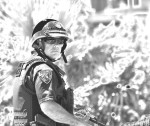Two pieces, one by David Brooks and one by Ta-Nehisi Coates, have been bouncing off one another in my head. Taken together, they suggest a two-prong path forward on police reform.
In “The Lost Language of Privacy,” Brooks makes the argument for what we’ll sacrifice with police body-cams. I think he’s right, that we’ll be sacrificing opportunities for police to serve as arbiters, mentors, confidants, etc.; that we’ll be making public a great deal that should be kept private; and that it’s still worth it.
In “The Myth of Police Reform,” Coates reiterates his argument that ‘police reform’ really requires a much broader revolution in how we think about the structure of our society. But here he begins to sketch his revolutionary goals by suggesting that we have been too cavalier in expecting/assigning our social problems to the criminal justice system. Using the recent headline shooting as a jumping-off point he asks:
Was Walter Scott’s malfunctioning third-brake light really worth a police encounter? Should the state repeatedly incarcerate him for not paying child support? Do we really want people trained to fight crime dealing with someone who’s ceased taking medication? Does the presence of a gun really improve the chance of peacefully resolving a drug episode?
The areas in which Brooks is concerned that body-cams will reduce police effectiveness are some of the same ones where Coates thinks we could do with less police involvement. Thus, the two-pronged approach: We should simultaneously equip all our police officers with bod-cams and scale back the realm of responsibility of the criminal justice system. We do need experts to deal with the homeless, but those needn’t be police officers, prison guards, or judges. Ditto domestic disturbances, child support, drug use/abuse, and a host of other issues.
Will this be expensive? In the short-term, certainly. But if we were really committed to this we could find savings by scaling back the militarization we’re currently engaged in. Over the long-term, it’s likely to be cheaper training and hiring dedicated experts than dealing with the fall-out from increasing police-related violence – in dollars, in lives, and in the health of our democracy.
Except … what if the problem is that the people with the lethal combination of guns and state authority aren’t spending enough time in community engagement? What if what really underlies all this violence is the fact that too many cops spend too much time with criminals and not enough with those they are meant to protect? What if it’s their daily experience that is warping their views and instincts? If that’s the underlying truth, removing these other interactions from their responsibility may only increase the divide between the protectors and the protected (much as we’ve done with the military).
But if Brooks is right, body-cams will already have this distancing effect. If Coates is right, the safety of our society may require that trade-off, if only by diminishing the number of police encounters. On balance, I think it’s clear that (a) we need to do something, (b) body-cams must be part of the solution, and (c) real reform will require a serious re-evaluation of the role of the criminal justice system in our social structure. Preserving the best evidence of police encounters while shrinking the number of such encounters would seem to be the best steps forward we could make right now.
(Photo by swong95765, under creative commons license)
Latest posts by Jason LaBau (see all)
- Take Down the Confederate Monuments - August 14, 2017
- The Democratic Split - August 10, 2015
- On Lincoln and Our Second Founding - July 6, 2015

